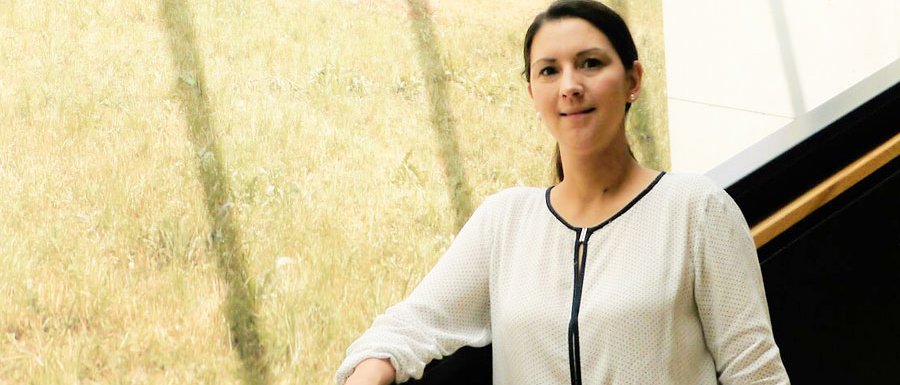Student representative Olivia:
“Studying in Straubing has potential”

TUMstudinews: Olivia, there are now about 250 Bachelor and Master students who are focusing on renewable raw materials in Straubing. What is the campus like?
Olivia: The way Campus Straubing was founded is quite unusual, because it was originally not intended as a Campus. It was designed as a research center for renewable raw materials, a place that was supposed to serve to pool expertise. Then, the site attracted state institutions, a science center for applied science and research, a technology center, and a lobby organization.
How did it become a campus?
Again, quite unusually – from top to bottom: First, doctoral candidates and scientific staff were hired, because they are a good fit for a research center anyway. Soon afterwards, a Master’s course focusing on renewable raw materials was offered, because the great interdisciplinarity at the research center was seen as an ideal basis starting point for graduates who want to venture into professional life as “all-rounders”. The Master’s course was very well received, which is why a Bachelor’s course was added four years ago.
What are the conditions for the students? Is there enough room for everyone?
Yes, there’s enough room for everyone, and the campus is constantly being extended. We are partly using an old monastery building that was newly renovated – and a new building was completed in 2009.
But there will be more, right?
Yes. A few weeks ago, we had a groundbreaking ceremony for another new building with lecture halls and seminar rooms. It is supposed to be finished in two years. The campus is relatively close to the city center, which has advantages – but there is also, of course, the fundamental problem of limited space for further buildings.
How is the mood on the campus?
Straubing is a very small site. There are 250 students, which means that we all know each other. We get along very well – not only among the students, but also with the doctoral candidates and professors. The communication paths are short and unbureaucratic, and there is a very pleasant policy of open doors.
Sounds like an ideal staff-student ratio.
Of course, the staff-student ration in Straubing plays an important role in our courses of study: of about 40 to 45 freshers in each course of studies, 30 to 35 complete their studies successfully.
The town of Straubing is quite small. Is this an advantage or rather a disadvantage?
With a population of 45,000, Straubing really is a relaxed town. You’ll find everything you need, but without the extreme hustle and bustle of a large city. There’s not much traffic, the distances are short, and you can get from A to B quickly by bike.
What about housing?
There isn’t much talk about having to look for an apartment for years, or about high rental rates. In Straubing, students can find affordable individual apartments. Another popular alternative are three-room to five-room flat-share apartments in the city center, with 150 square meters and roof terraces, for 400 Euros. You won’t find that in Munich. On the other hand, there aren’t many cultural attractions in Straubing. There are a few cafés and bars, but no cabarets and no vibrant nightlife. Here, “WG parties” are commonplace.
The courses will all be associated to TUM faculties or other institutions. What’s the relationship with the other TUM sites like?
So far, everything is quite simple, since there is only the Bachelor’s and Master’s course in Renewable Resources. This means that we are currently all students of the same faculty: Agricultural and Horticultural Sciences at the WZW.
How are the students organized?
We, the students from Straubing, are represented in the respective student association in Freising – with elected members and other members – and we are also directly involved in the student representative bodies. In order to show commitment, it is necessary to travel from Straubing to Freising every two or three weeks, but it is absolutely worthwhile in order to keep up the good relations with the department of Agricultural and Horticultural Science and with the respective student association. In addition, Campus Straubing has its own student representative who represents the students’ interests and is responsible for keeping up the exchange with the other student bodies at TUM.
To what faculties do the new courses of study belong?
The new courses will partly be assigned to other faculties. We are hoping to be able to establish functioning networks and a sound relationship here as well.
What do you think will change with the new courses?
Studying in Straubing has potential, as an interdisciplinary location with a focus on renewable resources. It will never attract the masses, but it is perfect for those who want to take on a distinct course of studies and who want to prepare themselves for an interdisciplinary position in the field of renewable resources, sustainability, and Biotechnology.
(Interview: Sabrina Czechofsky)
Olivia is a student of Renewable Resources with a focus on “chemical and material usage” in her second Master’s semester. As she is the speaker of the student representation of her campus, she is also involved in the student association of the faculty of Agricultural and Horticultural Science. She completed her Bachelor’s degree in Straubing, as one of the first generation of students in Straubing – which is why she is well informed about the extensive development of Campus Straubing.